University Nursing Assignment: Ethical Dilemma Case Study Analysis
VerifiedAdded on 2022/10/01
|5
|1451
|24
Case Study
AI Summary
This assignment presents a case study involving a nurse, Sheila, facing an ethical dilemma regarding obtaining informed consent from a German-speaking patient for hip replacement surgery. The patient's inability to understand English and the absence of a translator, coupled with the daughter's potentially incomplete translation, create a conflict with CNO standards of practice and nursing ethics. The analysis highlights breaches of patient care ethics, challenges in communication, and the nurse's dilemma between the doctor's pressure and ethical obligations. The assignment emphasizes the importance of patient rights, patient-centered care, critical thinking, effective communication, and the maintenance of nursing ethics and policies. The student reflects on the need for presence of mind, non-verbal communication skills, and timely action in such critical situations. The conclusion reinforces the significance of a nurse's critical thinking, interpersonal skills, and knowledge of care processes in managing complex ethical scenarios. The assignment underscores the importance of CNO and ICN standards, and the overall impact on patient outcomes.
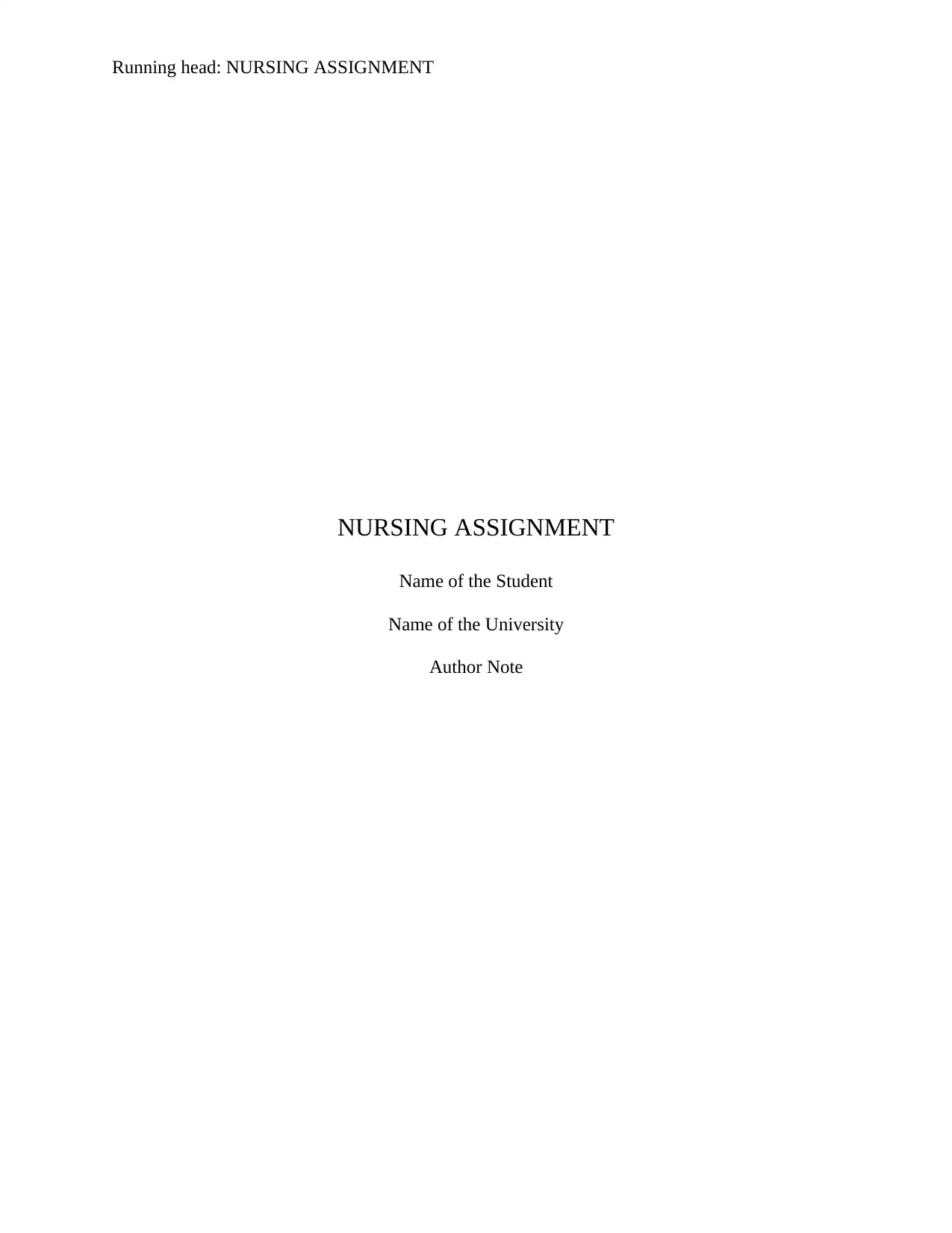
Running head: NURSING ASSIGNMENT
NURSING ASSIGNMENT
Name of the Student
Name of the University
Author Note
NURSING ASSIGNMENT
Name of the Student
Name of the University
Author Note
Paraphrase This Document
Need a fresh take? Get an instant paraphrase of this document with our AI Paraphraser
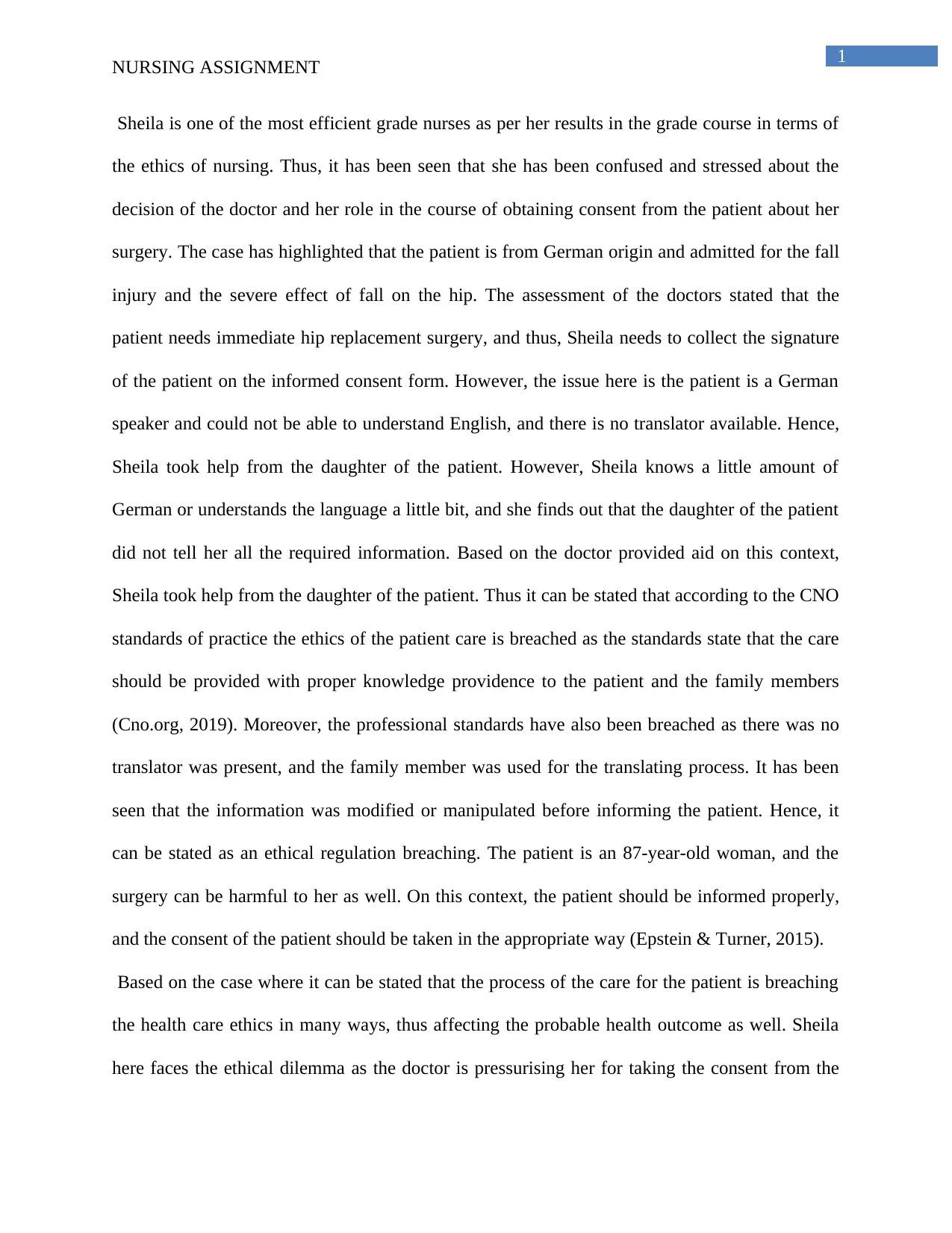
1
NURSING ASSIGNMENT
Sheila is one of the most efficient grade nurses as per her results in the grade course in terms of
the ethics of nursing. Thus, it has been seen that she has been confused and stressed about the
decision of the doctor and her role in the course of obtaining consent from the patient about her
surgery. The case has highlighted that the patient is from German origin and admitted for the fall
injury and the severe effect of fall on the hip. The assessment of the doctors stated that the
patient needs immediate hip replacement surgery, and thus, Sheila needs to collect the signature
of the patient on the informed consent form. However, the issue here is the patient is a German
speaker and could not be able to understand English, and there is no translator available. Hence,
Sheila took help from the daughter of the patient. However, Sheila knows a little amount of
German or understands the language a little bit, and she finds out that the daughter of the patient
did not tell her all the required information. Based on the doctor provided aid on this context,
Sheila took help from the daughter of the patient. Thus it can be stated that according to the CNO
standards of practice the ethics of the patient care is breached as the standards state that the care
should be provided with proper knowledge providence to the patient and the family members
(Cno.org, 2019). Moreover, the professional standards have also been breached as there was no
translator was present, and the family member was used for the translating process. It has been
seen that the information was modified or manipulated before informing the patient. Hence, it
can be stated as an ethical regulation breaching. The patient is an 87-year-old woman, and the
surgery can be harmful to her as well. On this context, the patient should be informed properly,
and the consent of the patient should be taken in the appropriate way (Epstein & Turner, 2015).
Based on the case where it can be stated that the process of the care for the patient is breaching
the health care ethics in many ways, thus affecting the probable health outcome as well. Sheila
here faces the ethical dilemma as the doctor is pressurising her for taking the consent from the
NURSING ASSIGNMENT
Sheila is one of the most efficient grade nurses as per her results in the grade course in terms of
the ethics of nursing. Thus, it has been seen that she has been confused and stressed about the
decision of the doctor and her role in the course of obtaining consent from the patient about her
surgery. The case has highlighted that the patient is from German origin and admitted for the fall
injury and the severe effect of fall on the hip. The assessment of the doctors stated that the
patient needs immediate hip replacement surgery, and thus, Sheila needs to collect the signature
of the patient on the informed consent form. However, the issue here is the patient is a German
speaker and could not be able to understand English, and there is no translator available. Hence,
Sheila took help from the daughter of the patient. However, Sheila knows a little amount of
German or understands the language a little bit, and she finds out that the daughter of the patient
did not tell her all the required information. Based on the doctor provided aid on this context,
Sheila took help from the daughter of the patient. Thus it can be stated that according to the CNO
standards of practice the ethics of the patient care is breached as the standards state that the care
should be provided with proper knowledge providence to the patient and the family members
(Cno.org, 2019). Moreover, the professional standards have also been breached as there was no
translator was present, and the family member was used for the translating process. It has been
seen that the information was modified or manipulated before informing the patient. Hence, it
can be stated as an ethical regulation breaching. The patient is an 87-year-old woman, and the
surgery can be harmful to her as well. On this context, the patient should be informed properly,
and the consent of the patient should be taken in the appropriate way (Epstein & Turner, 2015).
Based on the case where it can be stated that the process of the care for the patient is breaching
the health care ethics in many ways, thus affecting the probable health outcome as well. Sheila
here faces the ethical dilemma as the doctor is pressurising her for taking the consent from the
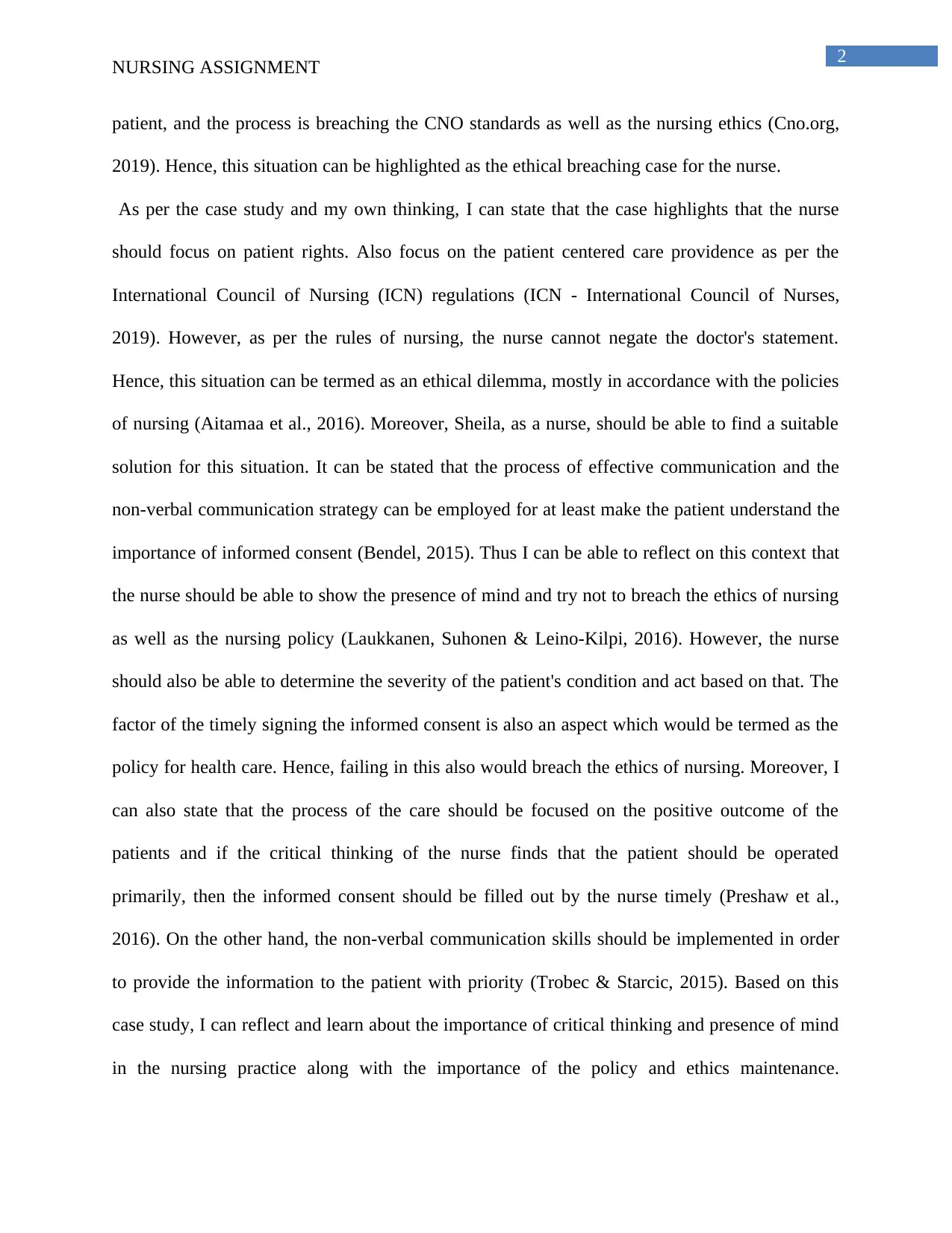
2
NURSING ASSIGNMENT
patient, and the process is breaching the CNO standards as well as the nursing ethics (Cno.org,
2019). Hence, this situation can be highlighted as the ethical breaching case for the nurse.
As per the case study and my own thinking, I can state that the case highlights that the nurse
should focus on patient rights. Also focus on the patient centered care providence as per the
International Council of Nursing (ICN) regulations (ICN - International Council of Nurses,
2019). However, as per the rules of nursing, the nurse cannot negate the doctor's statement.
Hence, this situation can be termed as an ethical dilemma, mostly in accordance with the policies
of nursing (Aitamaa et al., 2016). Moreover, Sheila, as a nurse, should be able to find a suitable
solution for this situation. It can be stated that the process of effective communication and the
non-verbal communication strategy can be employed for at least make the patient understand the
importance of informed consent (Bendel, 2015). Thus I can be able to reflect on this context that
the nurse should be able to show the presence of mind and try not to breach the ethics of nursing
as well as the nursing policy (Laukkanen, Suhonen & Leino-Kilpi, 2016). However, the nurse
should also be able to determine the severity of the patient's condition and act based on that. The
factor of the timely signing the informed consent is also an aspect which would be termed as the
policy for health care. Hence, failing in this also would breach the ethics of nursing. Moreover, I
can also state that the process of the care should be focused on the positive outcome of the
patients and if the critical thinking of the nurse finds that the patient should be operated
primarily, then the informed consent should be filled out by the nurse timely (Preshaw et al.,
2016). On the other hand, the non-verbal communication skills should be implemented in order
to provide the information to the patient with priority (Trobec & Starcic, 2015). Based on this
case study, I can reflect and learn about the importance of critical thinking and presence of mind
in the nursing practice along with the importance of the policy and ethics maintenance.
NURSING ASSIGNMENT
patient, and the process is breaching the CNO standards as well as the nursing ethics (Cno.org,
2019). Hence, this situation can be highlighted as the ethical breaching case for the nurse.
As per the case study and my own thinking, I can state that the case highlights that the nurse
should focus on patient rights. Also focus on the patient centered care providence as per the
International Council of Nursing (ICN) regulations (ICN - International Council of Nurses,
2019). However, as per the rules of nursing, the nurse cannot negate the doctor's statement.
Hence, this situation can be termed as an ethical dilemma, mostly in accordance with the policies
of nursing (Aitamaa et al., 2016). Moreover, Sheila, as a nurse, should be able to find a suitable
solution for this situation. It can be stated that the process of effective communication and the
non-verbal communication strategy can be employed for at least make the patient understand the
importance of informed consent (Bendel, 2015). Thus I can be able to reflect on this context that
the nurse should be able to show the presence of mind and try not to breach the ethics of nursing
as well as the nursing policy (Laukkanen, Suhonen & Leino-Kilpi, 2016). However, the nurse
should also be able to determine the severity of the patient's condition and act based on that. The
factor of the timely signing the informed consent is also an aspect which would be termed as the
policy for health care. Hence, failing in this also would breach the ethics of nursing. Moreover, I
can also state that the process of the care should be focused on the positive outcome of the
patients and if the critical thinking of the nurse finds that the patient should be operated
primarily, then the informed consent should be filled out by the nurse timely (Preshaw et al.,
2016). On the other hand, the non-verbal communication skills should be implemented in order
to provide the information to the patient with priority (Trobec & Starcic, 2015). Based on this
case study, I can reflect and learn about the importance of critical thinking and presence of mind
in the nursing practice along with the importance of the policy and ethics maintenance.
⊘ This is a preview!⊘
Do you want full access?
Subscribe today to unlock all pages.

Trusted by 1+ million students worldwide
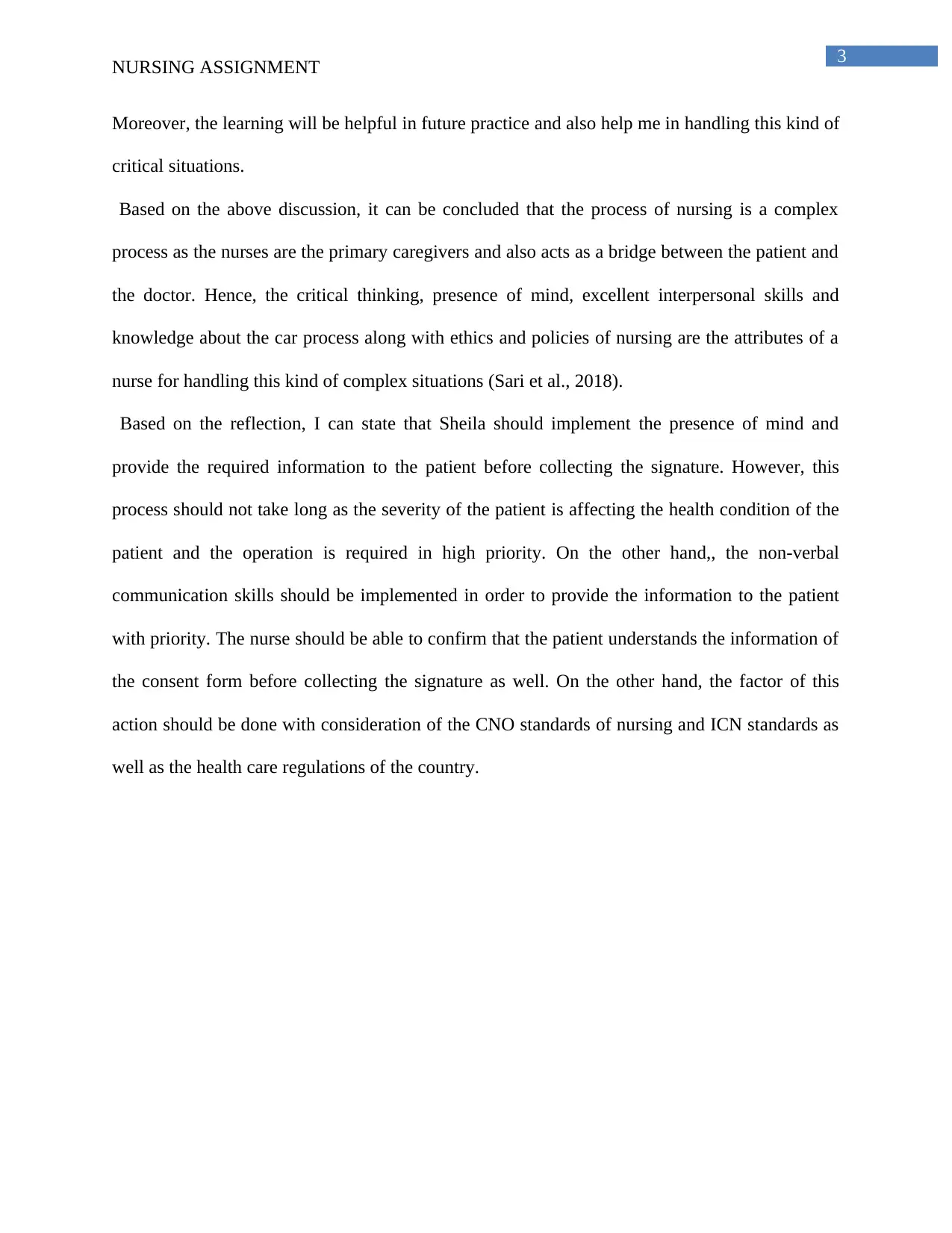
3
NURSING ASSIGNMENT
Moreover, the learning will be helpful in future practice and also help me in handling this kind of
critical situations.
Based on the above discussion, it can be concluded that the process of nursing is a complex
process as the nurses are the primary caregivers and also acts as a bridge between the patient and
the doctor. Hence, the critical thinking, presence of mind, excellent interpersonal skills and
knowledge about the car process along with ethics and policies of nursing are the attributes of a
nurse for handling this kind of complex situations (Sari et al., 2018).
Based on the reflection, I can state that Sheila should implement the presence of mind and
provide the required information to the patient before collecting the signature. However, this
process should not take long as the severity of the patient is affecting the health condition of the
patient and the operation is required in high priority. On the other hand,, the non-verbal
communication skills should be implemented in order to provide the information to the patient
with priority. The nurse should be able to confirm that the patient understands the information of
the consent form before collecting the signature as well. On the other hand, the factor of this
action should be done with consideration of the CNO standards of nursing and ICN standards as
well as the health care regulations of the country.
NURSING ASSIGNMENT
Moreover, the learning will be helpful in future practice and also help me in handling this kind of
critical situations.
Based on the above discussion, it can be concluded that the process of nursing is a complex
process as the nurses are the primary caregivers and also acts as a bridge between the patient and
the doctor. Hence, the critical thinking, presence of mind, excellent interpersonal skills and
knowledge about the car process along with ethics and policies of nursing are the attributes of a
nurse for handling this kind of complex situations (Sari et al., 2018).
Based on the reflection, I can state that Sheila should implement the presence of mind and
provide the required information to the patient before collecting the signature. However, this
process should not take long as the severity of the patient is affecting the health condition of the
patient and the operation is required in high priority. On the other hand,, the non-verbal
communication skills should be implemented in order to provide the information to the patient
with priority. The nurse should be able to confirm that the patient understands the information of
the consent form before collecting the signature as well. On the other hand, the factor of this
action should be done with consideration of the CNO standards of nursing and ICN standards as
well as the health care regulations of the country.
Paraphrase This Document
Need a fresh take? Get an instant paraphrase of this document with our AI Paraphraser
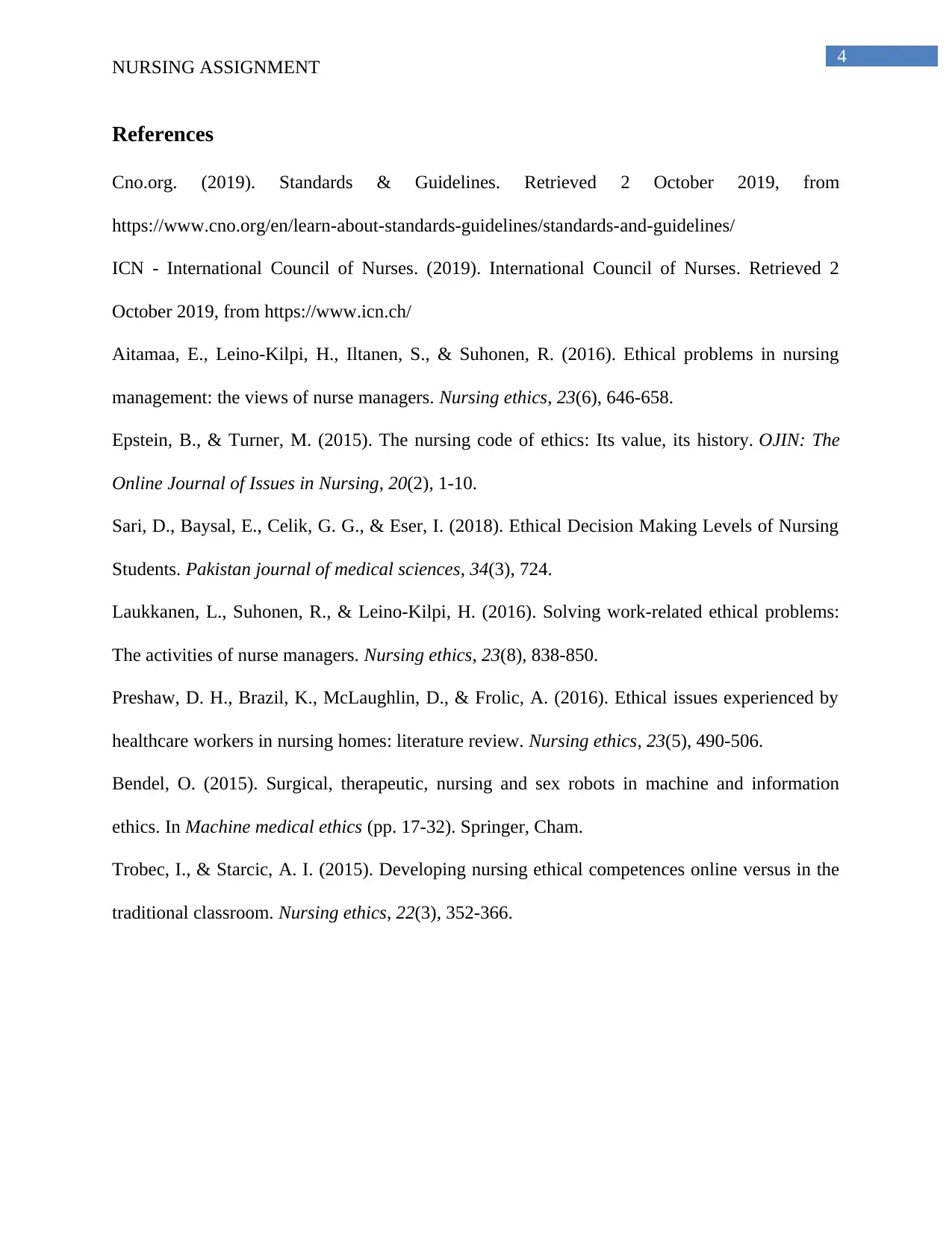
4
NURSING ASSIGNMENT
References
Cno.org. (2019). Standards & Guidelines. Retrieved 2 October 2019, from
https://www.cno.org/en/learn-about-standards-guidelines/standards-and-guidelines/
ICN - International Council of Nurses. (2019). International Council of Nurses. Retrieved 2
October 2019, from https://www.icn.ch/
Aitamaa, E., Leino-Kilpi, H., Iltanen, S., & Suhonen, R. (2016). Ethical problems in nursing
management: the views of nurse managers. Nursing ethics, 23(6), 646-658.
Epstein, B., & Turner, M. (2015). The nursing code of ethics: Its value, its history. OJIN: The
Online Journal of Issues in Nursing, 20(2), 1-10.
Sari, D., Baysal, E., Celik, G. G., & Eser, I. (2018). Ethical Decision Making Levels of Nursing
Students. Pakistan journal of medical sciences, 34(3), 724.
Laukkanen, L., Suhonen, R., & Leino-Kilpi, H. (2016). Solving work-related ethical problems:
The activities of nurse managers. Nursing ethics, 23(8), 838-850.
Preshaw, D. H., Brazil, K., McLaughlin, D., & Frolic, A. (2016). Ethical issues experienced by
healthcare workers in nursing homes: literature review. Nursing ethics, 23(5), 490-506.
Bendel, O. (2015). Surgical, therapeutic, nursing and sex robots in machine and information
ethics. In Machine medical ethics (pp. 17-32). Springer, Cham.
Trobec, I., & Starcic, A. I. (2015). Developing nursing ethical competences online versus in the
traditional classroom. Nursing ethics, 22(3), 352-366.
NURSING ASSIGNMENT
References
Cno.org. (2019). Standards & Guidelines. Retrieved 2 October 2019, from
https://www.cno.org/en/learn-about-standards-guidelines/standards-and-guidelines/
ICN - International Council of Nurses. (2019). International Council of Nurses. Retrieved 2
October 2019, from https://www.icn.ch/
Aitamaa, E., Leino-Kilpi, H., Iltanen, S., & Suhonen, R. (2016). Ethical problems in nursing
management: the views of nurse managers. Nursing ethics, 23(6), 646-658.
Epstein, B., & Turner, M. (2015). The nursing code of ethics: Its value, its history. OJIN: The
Online Journal of Issues in Nursing, 20(2), 1-10.
Sari, D., Baysal, E., Celik, G. G., & Eser, I. (2018). Ethical Decision Making Levels of Nursing
Students. Pakistan journal of medical sciences, 34(3), 724.
Laukkanen, L., Suhonen, R., & Leino-Kilpi, H. (2016). Solving work-related ethical problems:
The activities of nurse managers. Nursing ethics, 23(8), 838-850.
Preshaw, D. H., Brazil, K., McLaughlin, D., & Frolic, A. (2016). Ethical issues experienced by
healthcare workers in nursing homes: literature review. Nursing ethics, 23(5), 490-506.
Bendel, O. (2015). Surgical, therapeutic, nursing and sex robots in machine and information
ethics. In Machine medical ethics (pp. 17-32). Springer, Cham.
Trobec, I., & Starcic, A. I. (2015). Developing nursing ethical competences online versus in the
traditional classroom. Nursing ethics, 22(3), 352-366.
1 out of 5
Related Documents
Your All-in-One AI-Powered Toolkit for Academic Success.
+13062052269
info@desklib.com
Available 24*7 on WhatsApp / Email
![[object Object]](/_next/static/media/star-bottom.7253800d.svg)
Unlock your academic potential
Copyright © 2020–2026 A2Z Services. All Rights Reserved. Developed and managed by ZUCOL.




